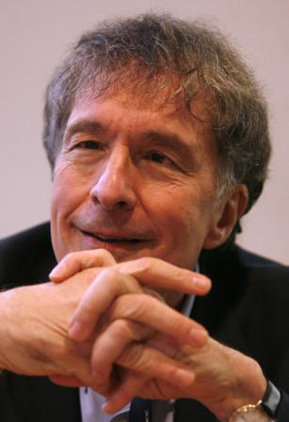Too Many Tests, Not Enough Help
Multiple intelligence theorist Howard Gardner speaks today at Sargent College

While working with children and brain-damaged adults 30 years ago, psychologist Howard Gardner noticed that some of his subjects who were believed to be gravely compromised possessed extraordinary abilities. The closer he looked, the more he learned — about their ability to learn.
Gardner was persuaded that different people were gifted in different ways, that there were many different kinds of intelligence. His research and writing persuaded a generation of educators to assess their students in more productive ways and were rewarded with a MacArthur Fellowship in 1981.
Now the John H. and Elisabeth A. Hobbs Professor of Cognition and Education at the Harvard Graduate School of Education, Gardner has authored more than 20 books and several hundred articles, earning him honorary degrees from 22 colleges and universities.
Gardner is giving the annual Dudley Allen Sargent Distinguished Lecture today at 5 p.m. at Sargent College. His talk, Multiple Intelligences: Past, Present, and Future, will be followed by a reception.
BU Today talked with Gardner about his latest book, Five Minds for the Future (Harvard Business School Press, 2007), and about the influence of his work on 21st-century educators.
BU Today: Five Minds for the Future explores the cognitive abilities that leaders will look for in the years ahead. What are those abilities?
Gardner: Three of them are cognitive: disciplined, synthesizing, and creating minds. The remaining two, equally important, concern our relations with other human beings — the respectful mind and the ethical mind.
Why are they important at this time?
In our globalized world, anything that can be automated will be, and so we have to cultivate capacities that machines don’t yet have. And since we live in a globalized world, if we don’t respect one another despite our differences and if we don’t behave in an ethical way, it will be a dog-eats-dog disastrous planet.
Is there anything we can do to cultivate those abilities?
Role modeling by respected individuals is probably the single most important factor. Clear signals of what is acceptable behavior and what is not need to be present. Anyone who doubts this, after the Wall Street debacle of recent years, is delusional. I hope that President Obama can set a positive example.
Is it possible to characterize the different types of intelligences that people are born with?
Instead of human beings possessing one generalized mental computer, human beings are better described as having a number of relatively autonomous computational devices. Intelligences include musical, spatial, interpersonal, and several others.
How have your theories about multiple intelligences changed education?
Teachers have known intuitively that there is more than one kind of intelligence — and, I might add, more than one kind of stupidity! My research, and that of others, provided scholarly and scientific support for this intuition and suggested what the several intelligences might be.
A quarter century after you put forth your theories, scholastic tests haven’t changed all that much. Should they?
Tests should get at understanding different disciplines and topics. Some tests, such as the Advanced Placement test and the International Baccalaureate examinations, do tap understanding, but most tests are simply exercises in regurgitation. I don’t favor testing for different intelligences unless there is some indication that the information would be useful for pedagogical or placement purposes. In our country, we spend much too much time testing people and not enough time helping them.
You’ve been working in recent years on something called the Goodwork Project. What is that?
For the last 15 years, I have been devoting all my time to the study of good work, work that is excellent technically, personally engaging, and carried out in an ethical way. Goodwork is the intertwining of these three Es. Having studied good work in over 1,200 professionals, my colleagues and I are now trying to enhance the incidence of good work among young people, working directly with secondary school students, college students, and selected other groups.
Howard Gardner will give the 10th annual address in the Dudley Allen Sargent Distinguished Lecture Series today, April 7, at 5 p.m. at Sargent College, 635 Commonwealth Ave., Room 101. His talk, Multiple Intelligences: Past, Present, and Future, will be followed by a reception. The lecture series began in 1999 to celebrate the 70th anniversary of the incorporation of Sargent College into Boston University. For more information click here.
Art Jahnke can be reached at jahnke@bu.edu.
Comments & Discussion
Boston University moderates comments to facilitate an informed, substantive, civil conversation. Abusive, profane, self-promotional, misleading, incoherent or off-topic comments will be rejected. Moderators are staffed during regular business hours (EST) and can only accept comments written in English. Statistics or facts must include a citation or a link to the citation.